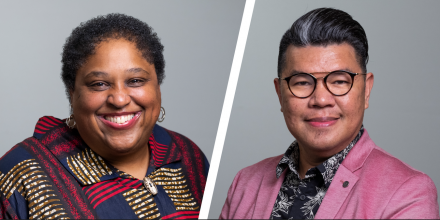Drs. Armstrong and Nolasco Among the First Faculty Chosen to Engage in the Wabash Center’s New Digital Salons
September 15, 2020

Two of Garrett-Evangelical Theological Seminary’s faculty, both from the field of pastoral care and counseling, have been selected to participate in year-long cohorts for theological educators, referred to as digital salons, at the Wabash Center for Teaching and Learning in Theology. Rev. Dr. Trina Armstrong, assistant professor of pastoral theology and pastoral care, will participate in salon one, focusing on mid-career African American faculty. Dr. Rolf Nolasco, professor of pastoral theology, will join salon five, looking at ways to engage imagination as theological educators.
The digital salons are designed to bring faculty peers into a sustained conversation. Facilitated by peers, the cohorts will grapple with the changes in teaching practices and the teaching life, sparked by the COVID-19 crisis. Each online group will be organized for monthly dialogues to consider creative ideas for the habits, practices, and approaches to teaching, while amid the novel corona virus pandemic.
“I am excited about embarking on this year-long journey with a wonderful group of mid-career African American scholars and our leaders, Dr. Willie Jennings and Dr. Carolyn Jones Medine,” said Armstrong. “In this heightened iteration of racial unrest in the midst of the ongoing COVID-19 pandemic, I am looking forward to intentionally engaging in honest reflection on my identity as a Black scholar with a redesign-design of my teaching and research to best benefit Garrett-Evangelical, my faculty colleagues, and my students.”
From the beginning, the Wabash Center has made it known that this is not a product-oriented group. Rather, through processes of imaginative and pedagogical reflection, these cohorts will rethink, reengineer, recast, redesign, and reconceive teaching during and beyond this crisis moment. Emphasis will be upon play, creativity, self-care, and keeping well the authentic voice in crisis.
“The pivot to emergency remote learning because of the COVID-19 crisis has catapulted us as faculty into unfamiliar territory,” said Nolasco. “The glaring opportunity to exercise theological imagination has been somewhat eclipsed by the urgency to provide a different kind of presence and pedagogy amidst fear and uncertainty that enveloped the world during the height of the pandemic. The affective labor exacted from this abrupt shift had to be suspended to focus on recalibrating how courses are delivered.”
Nolasco continued, “With the tumult of the spring semester in our rearview, we are now confronted with the trauma residue that has been momentarily deferred. This presents both a challenge and an opportunity as I return to teaching this fall semester with an acute awareness of the crisis’s impact on our psyche and collective consciousness. First, how might I enhance student engagement and level of motivation in this educational shift to virtual and visualized pedagogy while remaining attentive to everyone’s, including my own, embodied responses to the sequelae of these multiple pandemics? Second, what resources might I draw from that will help re-imagine teaching practices amid this kairotic moment? I hope to engage my Wabash cohort with these questions and am looking forward to our collective imaginings.”
Applicants could only apply for one digital salon and were required to meet specific criteria that were unique for each of the six salons being offered. The cohorts will begin meeting this fall with their work concluding in the summer of 2021. If feasible, the groups will culminate their work in a face-to-face summer retreat in Indianapolis.
A member of the Garrett-Evangelical faculty since 2016, Armstrong, an associate pastor at Dupage AME church, a licensed marriage and family therapist, and founder and clinical director at the Center for Wellness Encounters, is especially skilled at working with traumatized families, children, and adolescents. She regularly lectures and preaches on trauma, healing, and wellness as her research, ministry, and clinical work focuses on the impact of historical and cultural trauma on African American children, adolescents, families, and relationships.
Nolasco is an experienced professor, trained in pastoral and counseling psychology, mindfulness and contemplative spirituality, and affective neuroscience. He is also a psychotherapist and published author. He has vast experience in cross cultural communications from living and working across the world within varying social and cultural backgrounds. Nolasco joined the seminary’s faculty in 2018, and in 2019, he received the Exemplary Teacher Award by the General Board of Higher Education and Ministry of The United Methodist Church.
The Wabash Center for Teaching and Learning in Theology supports theology and religion faculty and doctoral students reflecting on their teaching practice — in both theological education and undergraduate education, in the United States and Canada. The Center facilitates faculty conversations about the goals and processes of teaching and student learning, and their programming develops faculty skills for critical reflection on teaching practice. To learn more about the Wabash Center’s digital salons, go to wabashcenter.wabash.edu/programs/digital-salons/.
Garrett-Evangelical Theological Seminary, a graduate school of theology related to The United Methodist Church, was founded in 1853. Located on the campus of Northwestern University, the seminary serves more than 450 students from various denominations and cultural backgrounds, fostering an atmosphere of ecumenical interaction. Garrett-Evangelical creates bold leaders through master of divinity, master of arts, master of theological studies, doctor of philosophy, and doctor of ministry degrees. Its 4,500 living alumni serve church and society around the world.

